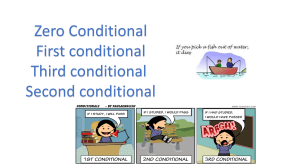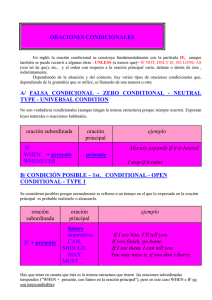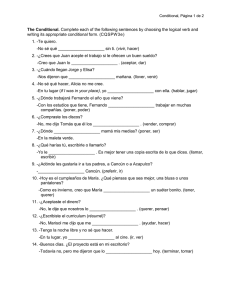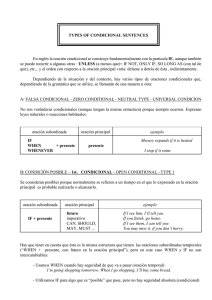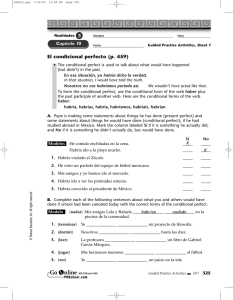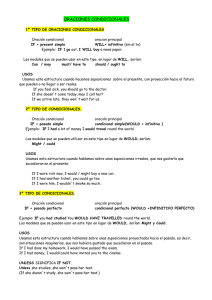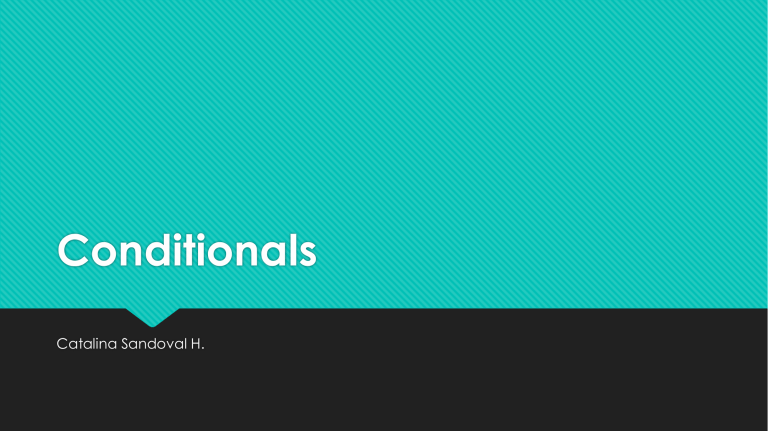
Conditionals Catalina Sandoval H. What are Conditionals??? • Los condicionales son oraciones que sirven para plantear escenarios, que pueden ser reales (como hechos científicos) o hipotéticos. • Se pueden referir a algo que sucede normalmente, a algo que podría pasar, o a algo que podría haber pasado pero no pasó. • Se forman por una oración que representa una condición, y otra que representa el resultado. Es decir, un hecho que lleva o puede llevar a otro hecho. • En inglés, se utiliza la palabra “if” para presentar la condición. Si la cláusula if (condición) va al principio, el resto de la oración (resultado) se separa con una coma. Si la cláusula if va después, no se pone una coma. Esto es igual que en español con la palabra “si”. • “Si calientas agua a 100°, se hierve.” • “Viajaría por el mundo si tuviera mucho dinero.” • “Si salimos mañana, pasaremos al supermercado.” • “Si me hubiera dormido más temprano, no tendría tanto sueño.” Types of Conditional Sentences • Hay cuatro tipos de frases condicionales y el uso de uno u otro refleja el nivel de probabilidad de la acción. • Zero Conditionals • First Conditionals • Second Conditionals • Third Conditionals • Mixed Conditionals Zero Conditional Sentences (if + present simple, ... present simple) If you heat water to 100 degrees, it boils. • Se utiliza en el caso de verdades generales (como hechos científicos). • Ambas cláusulas usan el presente simple. • En estos casos, el “if” se puede intercambiar por “when”. Examples: • If babies are hungry, they cry. • If you touch fire, you get burned. • If you mix hydrogen and oxygen, you get water. • Snakes bite if they are scared. • People die if they don’t eat. Zero Conditional Excersises https://www.perfect-englishgrammar.com/zero-conditionalexercise-1.html https://es.liveworksheets.com/workshe ets/en/English_as_a_Second_Languag e_(ESL)/Zero_Conditional/Zero_Conditi onal_xs1694288lc First Conditional Sentences (if + present simple, ... will + infinitive) If it rains tomorrow, we'll go to the cinema. • Se utiliza en el futuro, cuando es muy probable que algo suceda. • Se utiliza presente simple en la cláusula if y futuro simple en el resto de la oración. • El “will” puede intercambiarse por otros verbos modales como “may” o “should”. Examples: • If I have enough money, I'll buy some new shoes. • If I study today, I'll go to the party tonight. • If it doesn’t rain, we should go to the beach. • She'll miss the bus if she doesn't leave soon. • If you miss the bus, will you take the train? First Conditional vs Zero Conditional El first conditional se trata de una situación específica, mientras que el zero conditional se trata de hechos generalizados. Zero conditional: If you sit in the sun, you get burned. (Esto es algo natural, que sucede cada vez que alguien se sienta al sol.) First conditional: If you sit in the sun, you’ll get burned. (Esta es una advertencia en un momento específico.) First Conditional Excersises https://www.perfect-englishgrammar.com/first-conditionalexercise-1.html https://es.liveworksheets.com/workshe ets/en/English_as_a_Second_Languag e_(ESL)/First_conditional/First__conditio nal_io27135jb Second Conditional Sentences (if + past simple, ... would + infinitive) If I had a lot of money, I would travel around the world. • Aquí se plantean escenarios menos probables, como deseos o casos hipotéticos. • Se utiliza el pasado simple en la cláusula if y “would” más el verbo principal en infinitivo en el resto de la oración. Examples: • If Rachel had more time, she would learn to play the guitar. • If I were you, I wouldn't go out with that man. • If I had his number, I would call him. • She would travel all over the world if she were rich. • You would speak Japanese if you lived in Japan. Second Conditional vs First Conditional El first conditional habla de hechos que tienen muchas probabilidades de ocurrir en el futuro, mientras que el second conditional habla de eventos que es muy poco probable que sucedan. Muchas veces depende del punto de vista de quién esté hablando. First Conditional: If she studies hard, she'll pass her exams. (Es probable que ella estudie y apruebe sus exámenes.) Second Conditional: If she studied hard, she would pass her exams. (No creo que sea probable que ella estudie y apruebe sus exámenes.) Second Conditional Excersises https://www.perfect-englishgrammar.com/second-conditionalexercise-1.html Third Conditional Sentences (if + past perfect, ... would + have + past participle) If I had gone to bed early, I would have caught the train. • Este condicional se refiere a hechos del pasado que no sucedieron. • Es similar a las oraciones con el verbo “hubiera” en español (Si hubiera estudiado más, no habría repetido de curso.) • Se utiliza el past perfect en la clausula if y el “would have” más el verbo en pasado participio en el resto de la oración. Examples: • If she had studied, she would have passed the exam. • If I had known then what I know now, I would have done things differently. • If we had taken a taxi, we wouldn't have missed the plane. • Would you have liked to go to university if you had been able to afford it? • She wouldn't have been tired if she had gone to bed earlier. Third Conditional Excersises https://www.perfect-englishgrammar.com/third-conditionalexercise-1.html https://es.liveworksheets.com/workshe ets/en/English_as_a_Second_Languag e_(ESL)/Third_conditional/Third_conditi onal_fp182cd Exercises • Zero, First, and Second Conditionals: https://es.liveworksheets.com/worksheets/en/English_as_a_Second_Language_(ESL)/Condi tionals/Zero,_first_and_second_conditional_ma193325ko • All the Conditionals: https://es.liveworksheets.com/worksheets/en/English_as_a_Second_Language_(ESL)/Condi tionals/CONDITIONAL_SENTENCES_(ZERO_FIRST_SECOND_AND_THIRD)_ci291757fj
